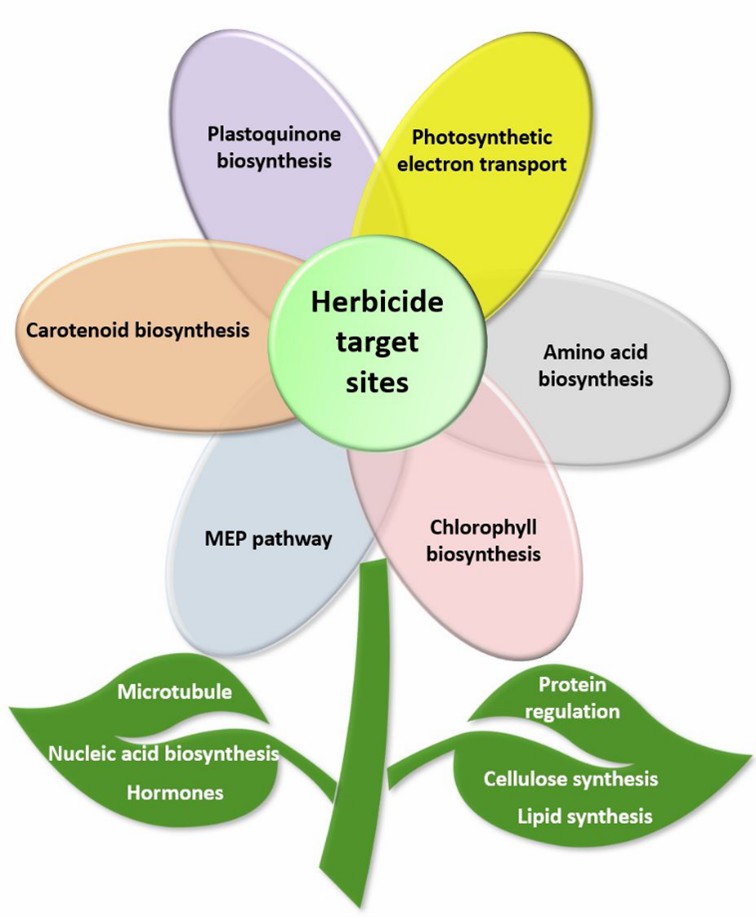Lifeasible focuses on applying natural metabolites in herbicidal applications and provides services to help study the herbicidal mechanism of natural metabolites.
Large amounts of chemical herbicides are used for weed management, leading to herbicide residue problems in the environment. There is an urgent need to develop environmentally friendly herbicides for plant protection. Many articles have been published on bioactive natural products as potential sources of herbicides, where chemosensitive substances in plant metabolites and some substances in bacterial and fungal metabolites have been shown to have herbicidal functions, including aspterric acid, cinmethylin, and pelargonic acid. Lifeasible helps to develop metabolites with herbicidal functions and provides herbicidal mechanism research services to help understand the herbicidal mechanism and facilitate the application and management of metabolites for herbicidal purposes.
 Fig. 1 Herbicide target sites (Dayan, 2019).
Fig. 1 Herbicide target sites (Dayan, 2019).
Lifeasible has been focusing on the research of plant protection mechanism of metabolites for a long time and has accumulated rich experience. Here we provide professional research services on herbicidal mechanisms of plant and microbial metabolites. Below are the general directions of our metabolite herbicidal mechanism research services.
Interference with plant photosynthesis
Photosynthesis is the energy source for plant growth, and cutting off the energy source for weeds can kill them. We provide services to study the mechanisms by which metabolites interfere with photosynthesis, including interference with plant photosynthetic electron transport and interference with plant photosynthetic pigment (including chlorophyll and carotenoids) synthesis. We will help explore whether the interference is specifically with the photosynthetic system I or the photosynthetic system II.
Interference with plant respiration
Respiration provides energy for the life activities of the plant body, and failure to perform respiration properly can cause weed death. We provide studies on the weed control mechanisms of metabolites interfering with plant respiration, including mechanisms that interfere with oxygen uptake processes, electron transfer, oxidation of NADH, and production of ATP and dark CO2.
Interference with the synthesis of important structural substances
Interfering with synthesizing important cellular structural components of weeds can kill the weeds. We provide services to study the mechanism of weed control by metabolites that interfere with the synthesis of structurally essential substances, including but not limited to interfering with the synthesis of structural substances in plant cell walls (e.g., cellulose and pectin), inhibiting the synthesis of plant lipids, interfering with the synthesis of amino acids and proteins, and inhibiting the synthesis of microtubules.
Interference with plant hormone levels and ion uptake
Plant hormones have an important regulatory role in plant growth, and plant uptake of ions from the soil also affects plant growth. We provide services to study the weed control mechanism of metabolite effects on weed hormone levels and ion (e.g., PO43- and K+) uptake to help discover more environmentally friendly and scientific ways to control weeds.
Joint research on multiple weed control mechanisms
There is probably more than one mechanism of weed control by metabolites, and we can support customized and joint studies of various weed control mechanisms, which enables a comprehensive exploration of weed control mechanisms of metabolites.
Professional experimental methods
We have mastered a variety of methods related to the study of plant life activities, which helps us in the analysis of metabolite herbicidal mechanisms. In addition, we have established standard operating procedures (SOPs) for mechanism exploration with reference to the existing literature for different herbicidal mechanisms to facilitate professional and rapid herbicidal mechanism exploration of metabolites.
Exploration of herbicidal mechanisms aided by structural analysis of metabolites
We performed the analysis of the structures of metabolites, comparing them to the metabolite database we established to quickly obtain the general direction of their herbicidal mechanisms based on their structures.
Lifeasible specializes in providing services to help develop metabolites with herbicidal activity, and we provide services to study the herbicidal mechanism of metabolites. If you have any need for related services, do not hesitate to contact us to serve you.
References
Lifeasible has established a one-stop service platform for plants. In addition to obtaining customized solutions for plant genetic engineering, customers can also conduct follow-up analysis and research on plants through our analysis platform. The analytical services we provide include but are not limited to the following:
July 13, 2024